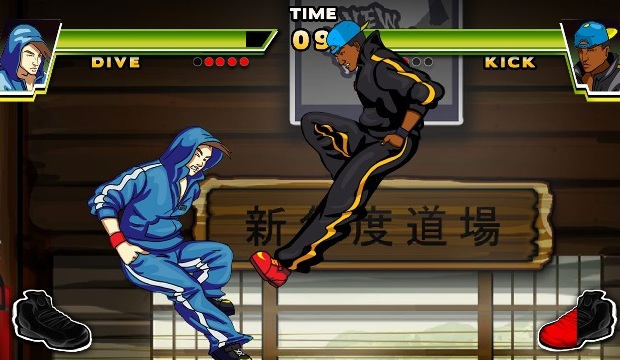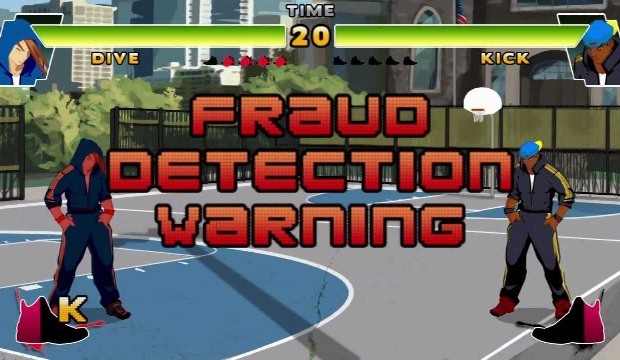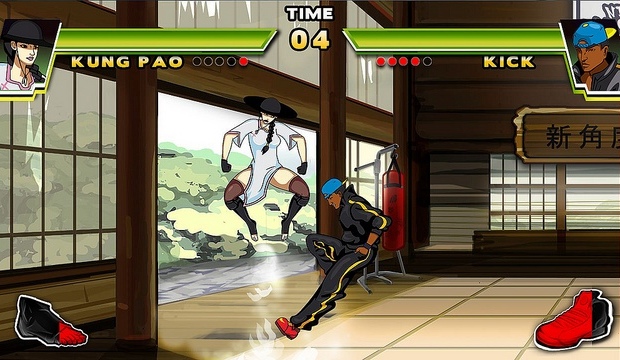Divekick Review
What’s a fighting game all about? I’m talking about the core, the ideals, the foundation – what is it that ultimately makes a fighting game? Ponder that for a little while, I need a cup of tea anyway…
Ok, what ya got? Where you thinking combos? No, it’s not that. Hadoukens? Absolutely not, you can make a fighter without projectiles. Big thighs? Well, partially.
Mind games, that’s the crux of the genre. “What is my opponent going to do next? Well last time I tried to jump in they hit me with an uppercut, and when I fireball they just jump up, but what if I can bait an uppercut with a neutral jump and then move in for a punish…” This is why the genre is so compelling, and why it’s always been better played against sentient beings rather than AI. But it’s also the reason why the genre is so hard to breach: knowledge will forever crush mindless play, and being crushed by someone who has attained mastery is depressing, and often confusing.

This is why Divekick, a two-button, Kickstarted fighter created by One True Game and Iron Galaxy (the studio responsible for many of Capcom’s recent HD ports such as Street Fighter III: Third Strike and Darkstalkers Resurrection) is arguably the best gateway drug to the genre yet produced, and an absolute blessing in an ocean of combo-centric brawlers. It’s simple, but utterly brilliant with it, distilling the spirit of the genre into a shot-like jolt of pure mind-game-dominated beauty.
Yep, you read that right: two buttons. Divekick is a game about two simple things activated by those two simple buttons; Diving (well, jumping) and kicking back down towards the ground at an angle. This technique may look bizarre, and you’d be correct to raise an eye brow at the visual concept, but the “Dive Kick” as an attack has been present in fighting games going back many, many years. This element of pastiche is a big part of Dive Kick, but we’ll get to that later.
Your two buttons correspond to these two actions; one is for a high vertical jump, and the other will activate your angled kick. You can only kick in the air though, so pressing the kick button while on the ground lets you jump backwards. The only way to move forwards is through Dive Kicking. The winner of a round is the first player to connect a single attack, and the winner of a “game” is the first to win five rounds.

Already the brilliance should start to show. The entire game is a mental contest of spacing and baiting, trying to coax an opponent into a kick that places them right in front of your foot dive. You’ll use small hops and backward leaps to keep space before going into a large leap and aiming for your opponent’s head, or you’ll pressure an enemy into a corner with aggressive moves, trying to encourage a worried mistake born from their undesirable position.
The game also adds a super meter to proceedings that is built simply by kicking, with each character having two “powers” activated by pressing both buttons at the same time. One power is used on the ground, the other in the air. For example, the main character, Dive, can use one power to jump forward, while his other ability lets him return to the ground, mid-jump, instantly. Filling the bar completely will also activate “Kick Factor”, giving your character a red glow and heightened abilities for a period of time.
If your opponent kicks you in the head, however, you will completely lose any accrued meter in the next round and start in a dazed, underpowered state. Rounds are also short, lasting a mere 20 seconds, and if the the timer ticks to 0 then the player closest to the middle of the stage wins the round.

Divekick works because it’s simple. The jump and kick concept is easy to explain, and just as straightforward to play. Yet while this basic idea would be amusing enough it’s the fact that it then adds so many creases to the design – the super meter, the time-out mechanic, the headshot element – alongside a cast of 13 unique characters that helps Divekick transcend its simple concept and create something that’s – much to the surprise of many people that play it – a legitimately brilliant fighting game.
Divekick works, and appeals to pretty much anyone, because winning isn’t about repeating some combo you cooked up in the lab or exploiting some cheap trick to chink away health. Divekick works because it’s about spacing out an opponent, reading their tells, and gaining mastery of your character’s movement and abilities. This also means it’s easy to know, realise, and analyse why you lost, and possible for even a novice to consider how they can go about playing better.
Yet for all this beautiful gameplay Divekick does suffer in one area: presentation. It’s not that Divekick’s presentation is bad, more that it’s designed primarily by and for its Kickstarter community, which essentially doubles up as the Fighting Game Community.

There are references that I’m sure anyone will understand. Kung Pao is clearly a Mortal Kombat ripoff, while the two lead characters, Dive and Kick, are akin to Ryu and Ken in their intense similarity. A novice fight fan might even clock the game’s final boss, S-Kill, as a reference to ex-Capcom-now-Sony man Seth Killian. But will someone not in tune with the scene understand the Stream Demon? The Baz? Jefailey? Markman? Why losing all five matches in a row makes you a Fraud? Why the gem selection screen is referred to as “meaningful character customisation”? The game’s comedy goes for the jugular of the fighting game community just as often as it does fighting games in general, and it will bemuse many players because of it.
Sure, it’s easy enough to have fun with Divekick and be completely ignorant to the origin of every joke, but the game puts its characters and concepts forward in such a way that you know everything in Divekick is played for laughs, and it can be frustrating to be in the “I don’t get it” camp. Like watching This is Spinal Tap with no previous Heavy Metal appreciation, or reading Scott Pilgrim vs. The World without an ample education in video games, the vast majority of Divekick’s gags will be lost on those that don’t frequently watch EVO streams, and those people will always feel that they’re missing some greater point.
In a way, this is the quintessential Kickstarter game, designed explicitly for the people that wanted to play it enough that they stumped up the cash in advance. It just so happens that those people are the fighting game community. That it results in being somewhat dog-tuned to that crowd is both admirable in its commitment, but also unfortunate given the potential confusion it will cast over many other players.

Is the game’s onslaught of community-centric gags a reason to avoid Divekick? Absolutely not. The problem is simply that, while the comedy is perfect for the crowd it’s designed for, for the expanded non-hardcore fighter audience that Divekick could so easily help bring into the genre with its gameplay, it’s clique-y presentation may do just as much to hinder enjoyment as being the recipient of a 60-hit Dr. Doom combo in Marvel, or getting trapped in an Akuma vortex in Street Fighter IV. And every time this happens, I will cry a single tear.
The content spread is admittedly thin, offering only story, local versus and online play. That said, the game glistens like the sun when played against other humans, and could easily be enjoyed for tens upon tens of hours with a like-minded clutch of friends and rivals.
VERDICT – Divekick’s niche presentation is only a shame because everyone should play Divekick. This is a fighter that’s all about the fundamentals, about reading your opponent and then making intelligent plays based on their predictable attacks and emerging tells. If you know fighters then you’ll understand the appeal immediately, but even if you’re just a casual fighting fan, or not a fighting fan at all, call your friend/spouse/mistress/Meerkat to the second controller and go a few rounds. Divekick is brilliant, you’ve just got to play it. You might not understand the humour, but nestled under that layer of in-jokes is an exquisite competitive game, and you might just understand fighting games a little bit more for playing it…

VERY GOOD. An 8/10 is only awarded to a game we consider truly worthy of your hard-earned cash. This game is only held back by a smattering of minor or middling issues and comes highly recommended.





